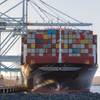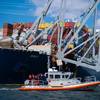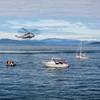By Steven L Herman, Auxiliary Public Information Officer, U.S. Coast Guard Far East Activities (FEACT)
TOKYO - For the first time, ministers responsible for transportation security have made coordinated plans to prevent future terrorist attacks.
Transportation ministers from 14 countries met in Tokyo (Jan. 12-13) and announced their unanimous commitment to greater international cooperation on transportation security and, in particular, to take all possible measures to thwart terrorism targeting public transport systems.
Maritime security was high on the agenda of the first Ministerial Conference on International Transport Security and of particular focus were small cargo ships, fishing vessels, harbor tugs, and boats like the one used to launch the October 20, 2000 attack on the USS Cole in Yemen.
These smaller vessels are exempt from the latest International Convention for the Safety of Life at Sea (SOLAS) and Long-range Identification & Tracking regulations (LRIT).
“You have to look at vessels three ways: ships as a targets, ships as a weapon or ships that carry weapons of mass destruction,” explained Captain Michael Blair, Commanding Officer of U.S. Coast Guard Far East Activities (FEACT).
Officials from the U.S. Department of Homeland Security and U.S. Department of Transportation said the international cooperation to focus on the smaller vessels is in the interest of U.S. national security because while the U.S. Coast Guard has enhanced security regulations and surveillance of smaller vessels in the United States, it does not have such authority outside U.S. territorial waters.
“We have a declaration of a ministerial statement towards setting the pace for everyone to comply, including, to me, what was very heartening, the adoption of the small ship provisions in this statement. So, I think, this will go a long way to the whole SOLAS and LRIT kind of security for maritime,” said U.S. Secretary of Transportation Norman Mineta.
The U.S. Coast Guard flag officer responsible for regulatory programs for commercial vessel safety, port safety and security also said he was heartened by the group’s desire to bolster identification and tracking of smaller vessels.
“Looking at vessels less than 500 gross tons -- non-passenger vessels -- that are not addressed in SOLAS, is an area that International Maritime Organization (IMO) hasn’t gotten into yet. So that is one area that this group agreed to send a message to IMO for further study on these issues,” said Rear Admiral Thomas H. Gilmour, Assistant Commandant for Marine Safety, Security and Environmental Protection.
Delegates also discussed the serious threats to maritime security, noting that armed robberies and acts of piracy are occurring with alarming consequences, especially in critical trade waterway between the Malaysian Peninsula and the Indonesian island of Sumatra.
“The Strait of Malacca and Somalia were specifically mentioned as part of this conference, so it furthers our goals in those areas as well,” said Admiral Gilmour in a post-conference interview here.
Admiral Gilmour noted that the U.S. Coast Guard is taking a proactive role far from its own shores in anti-piracy and counter-terrorism activities.
“We’re working with both the Indonesia and Malaysia coast guards to help them to be more effective in addressing these kinds of issues,” Admiral Gilmour said.
The transport ministers, at the conclusion of the two-day conference, warned that terrorists were refining and adapting their tactics to find ways around stringent security regulations implemented in many countries after the September 11, 2001 attacks on the United States.
Officials from Japan and Britain emphasized the value of sharing lessons learned from terrorist attacks on public transport. Both countries have been victims of such attacks –- Tokyo’s subject system was the target of a lethal sarin gassing by an apocalyptic cult in 1995 and London’s buses and subway trains were hit last July by suicide bombers, for which al-Qaeda claimed responsibility.
"We benefited greatly from the closed circuit TV on our transit network," said British Transportation Secretary Stephen Ladyman. "That was an important lesson that we were able to pass on to others."
Japan demonstrated a facial recognition system at the conference that its Transport Ministry said would be implemented soon to scan every railway passenger.
The system, developed by NTT Communications, instantly sends facial images to a database and any matches of suspected terrorists immediately sets off an alarm.
Ministry officials attending the conference revealed cameras would be installed in March for experimental use of the scanning system at the wickets of the Kasumigaseki subway station in downtown Tokyo.
Besides host Japan, the United States and the United Kingdom, other countries represented at the unprecedented meeting were Australia, Canada, China, Germany, Indonesia, Italy, Malaysia, Singapore and South Korea. Also attending were officials of the IMO, the European Union, the World Customs Organization and the International Civil Aviation Organization.
Japanese Transport Minister Kazuo Kitagawa, at a post-meeting news conference, said that he and his counterparts want to ensure transportation systems are not disrupted by terrorists.
“We want to send a strong political message of our determination to fight against terrorism,” Mr. Kitagawa said.
Japan called for the meeting after the terrorist bombings on the London transportation system last year.
“I'm really impressed that we've had as many nations responding to Minister Kitawaga and Prime Minister Koizumi's invitation to be here for this international ministerial,” said Mr. Mineta. “It is important that we all take a collaborative approach and to me it's very heartening that we've had this large response.”
The specter of a potential human pandemic sparked by avian influenza also was raised at the conference at the suggestion of the U.S. delegation. Ministers agreed their respective nations would need to work together to reduce the risk of bird flu being spread by ships, planes or trains should human-to-human transmission be detected.
Japanese officials said they would report the outcome of the conference to the Group of Eight summit to be held in St. Petersburg, Russia in July.
Sponsored Content
Chris-Marine’s solutions help to prolong engine lifetime

AST is now AST Networks, bringing you remote connectivity wherever you are

March 2024
 Read the Magazine
Read the Magazine

 Read the Magazine
Read the Magazine
This issue sponsored by:

New Orleans is Sinking, and it is Not Tragically Hip
March 2024
 Read the Magazine
Read the Magazine

 Read the Magazine
Read the Magazine
This issue sponsored by:

Preparing for Change, ABS Enhances the Marine Vessels Rules Book
Subscribe for
Maritime Reporter E-News
Maritime Reporter E-News is the maritime industry's largest circulation and most authoritative ENews Service, delivered to your Email five times per week










